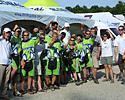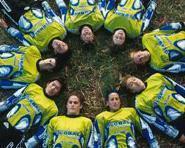
Recently on Cyclingnews.com |
Think Global, act local
Global Racing team
Riders Greg Minnaar Born: November 13, 1981 Missy Giove Born: January 20, 1972 Sean McCarroll Born: November 5, 1977 César Rojo Born: April 17, 1981 Naoki Idegawa Born: April 22, 1980 Markolf Berchtold Born: February 9, 1980 Marielle Saner Born: March 22, 1977 Matti Lehikoinen Born: April 19, 1984 |
The Global Racing team isn't like most of the others. True to its name, the team has riders from every inhabited continent on Earth.
And although Global considers itself a development team, it has managed to collect quite a number of World Cup trophies since its beginnings in 2001. By the end of its first year, Global had won the World Cup (Greg Minnaar) and a globe for Missy Giove's 2nd place in the women's World Cup.
Paul Mirtschin spoke to team director Martin Whiteley as he took a break from the post season sponsorship search. Prior to starting up 23 Degrees Sports Management and Global Racing, Martin was responsible for all offroad cycling disciplines at the UCI, with direct control of the Mountain Bike World Cup. Prior to this he was the CEO of the Australian Cycling Federation.
Cyclingnews: Could you expand on how Global's team structure and sponsorship differs from most other teams?
Martin Whiteley: Well I think the biggest difference is that up until recently we were the only team that was not driven by the bike industry and bike industry sponsorships. All products we used on the team were chosen by the riders collectively, as the most popular product to use to achieve results. We weren't paid by any supplier to use their product. This gave us, and them, added credibility. When we went to a company to ask if they would supply us, it was on the basis that we felt their products were the best out there.
 |
We felt the industry was not large enough to support the future expansion of MTB racing, and so out of industry money must be sought. Now other teams are doing this more and more and we welcome that. We are also more about development and not just buying champions to sell bikes. We are about developing riders to make them more famous in their home continents and therefore inspiring more young people from their region of the world to get into the sport. Hence our web site being in six key languages. I see our job as not selling bikes, but selling the sport.
CN: It has been reported that the team often camps out together rather than booking into motels, do you feel that this "communal" accommodation helps with the teams unity?
MW: That's not really what we do. We book the same accommodation as most teams, condos or hotels. I guess the main difference is that we encourage the team to cook for themselves and to gain some skills in that area. Those that are better cooks teach others how to eat well while on the road. We don't encourage fast food, and we provide a weekly allowance for the weekly shopping and take the team to the nearest supermarket to get what they need to cook for the week. We have one team dinner a week where we all get together, usually a Thursday, and discuss the upcoming weekend, but generally we let them manage their own meals and social time.
CN: Injuries plagued riders such as Missy and Minnaar, have you asked them to change training/racing schedules as they recover? How much freedom do the riders have in choosing what races they can do?
 |
MW: To be perfectly frank, we don't need to tell Missy anything about training. She is the best person for managing her training and recovery. She and I are pretty close and we had a long talk about her "throttle control". We feel it's better for her to try and win more races with her head and not just her absolute exuberance and superior physical conditioning. She understands that as a creature of habit, it's hard to change these things now, but all riders need to understand that there are more settings than the simple "on" and "off" buttons when it comes the downhill racing. Missy lost a few opportunities, and injured herself, by racing harder than she needed to at certain times. I think she will address this well, but her training regime is the best out there for any woman racer, she is incomparable, and an example to all athletes.
Greg has recently taken a new direction in his training by hiring Nicolas Vouilloz's coach, Stephane Girard. I'm sure that Stephane will bring about some important changes to the way that Greg approaches the off season, and the race season. I think it's a smart move to hire your idol's coach, and already I've seen some of Stephane's ideas and they are really significant. Greg should find this will take him to the next level in the sport.
CN: Given the domination of riders such as Nico and Peaty, the Global riders still had a great year. How happy are you with the team's results?
 |
MW: Overall yes. If you take out Missy's and Greg's injuries, the rest of the team members all improved their world rankings and/or performances. We must also remember that even though we won the UCI team trophy in our first year, that was not our goal. We still consider the team to be a "development team" and not a team for world domination. Our result this year was more in line with our original aims, even with Missy and Greg having bad luck. Winning the team trophy in 2001 was great, don't get me wrong, but we mustn't let that dominate the reason for why we show up at events. There are many other reasons why we do what we do.
CN: With some of the Global riders competing in cross-country races (and I remember a bonus program at one race) are there any plans to add cross-country riders to the team?
MW: No. The Global Racing brand for us is an extreme sports brand best suited to downhill and four-cross. I'm not saying that I'd never like to have a cross-country team, but if I do it won't be with that brand name. I currently enjoy very much working with the two cross-country athletes our company manages, namely Kashi Leuchs (NZL) and Liam Killeen (GBR), and that keeps me involved in the cross-country discipline. The reason the Global Racing downhill riders do the occasional cross-country race is because they enjoy it and they are very fit athletes. They have often finished top 70 in World Cup cross-country races, and there are few cross-country riders that could do that in a downhill. It's good to show people that downhillers aren't cowboys that simply let go of the brakes and take risks. They are very conditioned athletes that need endurance, just as track pursuit riders who only race for four minutes, need a solid endurance base. We throw a bonus into the mix to have a bit more fun with it!
CN: The team takes part in youth outreach programs, how is that all going?
MW: Excellent. Since we started the team we've visited more than 40 schools world wide, held training clinics at BMX clubs from Scotland to Japan, helped local kids build new tracks, visited childrens hospitals, and chatted on community radio shows and so on. It's an integral part of the riders' development, and a cornerstone of what the team stands for, promoting MTB to kids and inspiring them to get off their sofas and go ride their bikes.
CN: Rumours abound about Arai pulling their sponsorship from the team, care to comment?
 |
MW: We have a current contract with Arai for another two years as communications sponsor, and that position has not changed. It's not the bulk of the funding for our team, but it accounts for a good portion of it and we are happy to work with Arai.
The majority of the funding for the team in 2001 and 2002 came from an investment company in Japan, who have indicated that they cannot continue to fund the team due to the harsh economic climate brought about due to the recession in Japan and the stock market fall out from the September 11 attacks. However we are busy securing a title sponsor for the team for next year and will have more news on the outcome of these meetings in the coming weeks.
CN: With teams finding it harder to find sponsors, and some teams even folding, do you think that there is anything that the UCI can do to help promote the team sponsors?
MW: Clearly the World Cup needs an improved TV situation. The TV did improve in 2002 over 2001 as far as viewership numbers on Eurosport, but distribution needs to increase, and a return to some live events would be helpful. This requires more funding and as far as I know there is no title sponsor for the World Cup in 2003, and until there is, and we see a return to the type of media impact experienced in the late 90's, teams will have trouble attracting major sponsors. The UCI are working hard to achieve this, but I think 2003 will not provide the immediate return to the so called glory days of 1997 to 2000. Maybe in 2004.
CN: Do you feel that there are any changes that could be made the race structure to help with this? We have seen the introduction of four-cross boost coverage of races, and do you think the sport needs to change to become "TV friendly"?
 |
MW: My personal belief is that we do need to make some fundamental changes. The downhill has gone through some important steps in this regard. Some World Cup downhill races have become shorter and that's a good thing in my opinion. It means that the margins between riders are much smaller and the suspense is retained for the entire TV program. Split times can change, whereas in longer races the splits rarely differ from the overall results, proving that nothing much is gained by extended the race course.
Shortened race courses will also encourage more promoters to hold downhill events (currently there three times as many cross-country events on the calendar as downhill) as they are cheaper to run and easier to televise when they're shorter. They need less volunteers, course work, course materials, protection materials etc. I'm not saying get rid of the long downhill altogether, there will always be a place for Kaprun and its course, but there is no doubt in my mind that courses like Grouse Mountain in Vancouver, which is less than two minutes long, gives the riders a greater challenge to remain perfect for their run, ensures there are fans lined along the entire course top to bottom, and the TV viewer is on the edge of their seat, much like they are in the downhill ski competitions.
The four-cross is a big step in the right direction, and with the evolution of courses and some new race qualifying and lane selection ideas being discussed, we could see even more excitement in that discipline. It's sure that it will continue to evolve and that's a good thing.
 |
Right now I feel the danger is in the cross-country becoming a little stale. There is no question that Olympic status for cross-country is vital, and that will always be an important part of what cross-country stands for. It's amazing that even after only 15 years or so, it can be referred to as the traditional arm of MTB racing. But I, along with the members of IMTTO (International Mountain Bike Trade Team and Tech Organisation) believe that short track cross-country racing, as proven successful on the NORBA circuit, needs to be included on the World Cup circuit. These races are dramatic, short and highly entertaining for both the TV and on-site spectator. I checked in with most of the top riders in the world during the World Cup finals in France and they agreed it was necessary to look at such an inclusion. The UCI is not wanting to rush into this, but I fear the longer we wait, the more critical this could be. Twenty minute races over a short course that allows most spectators to view 90 percent or so of the racing, is an excellent promotion of the MTB sport, and as shown in the US for the past three years, it doesn't detract from the Olympic discipline of two hour cross-country racing, and the riders cope with it just fine. IMTTO recently proposed to the UCI that during a triple World Cup, Saturday would see the Olympic cross-country races for men and women, Saturday night the four-cross, Sunday morning the downhill semi final, followed by short track cross-country, and then the downhill final in the afternoon. We think that's a pretty entertaining weekend and one that shows mountain biking to be dynamic and exciting.
There's a limit to how "TV friendly" a sport should become. MTB must not sell its soul for short term gain, but must seriously consider its evolution as a sport, with TV as one guiding force behind such changes.
CN: The Arai/Global team certainly had some fantastic results over the last few years, and magazine/web promotion of the team was very high. Hopefully any sponsors you are talking with at the moment acknowledge this.
MW: Many thanks for your comments. We're not the standard type of MTB team the way we have structured our financing, and we are not a bike industry promotional vehicle, so some people have had a hard time getting their heads around that, but I believe we made a significant impact, especially in the non-industry media, which is our main goal. As Global Racing is now an established brand with a strong record over the past two years we are hopeful of being out there again in 2003.
For more information on Global Racing, visit araiglobal.com

